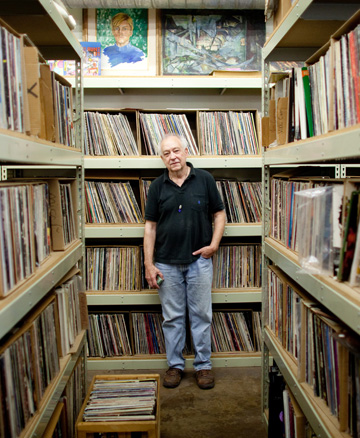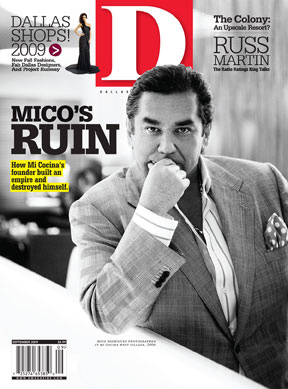Walking into Bill’s Records on a July afternoon gives me the same feeling, I imagine, that people who grew up in Rust Belt towns get when they return home for a visit. It’s a soft punch to the heart, a mixture of guilt and sadness. I hadn’t been to Bill’s in maybe five years, probably more, so I didn’t see its slow slide into near obsolescence at its old super-sized North Dallas location. And I had yet to see its small-scale rebirth in The Cedars, snuggled up next to Poor David’s Pub, in the shadow of the Southside on Lamar loft complex.
Owner Bill Wisener is right where I left him all those years ago, sitting behind the counter near the front door, clad in his uniform of jeans and faded polo shirt. But apart from the young employee lurking near the counter, I am the only other person here, a head count that would have been impossibly small on a sunny summer Friday a decade ago. Back then, and for much of the two decades prior to that, Bill’s Records was sort of a musical clubhouse. It had the best records, and so it attracted the best employees, and the best customers, too. The aisles were choked with people thumbing through cardboard boxes, and the air was thick with debates over this band or that album and more than a little cigarette smoke. Bill’s Records was High Fidelity, but it was even better. It was the only place I wanted to be on a Friday afternoon.
Today, that’s all gone. I feel like I’ve come home after that factory closed down, and, worse, I did nothing to stop it. It’s quiet in here, a record store of all places, the only sound coming from the air conditioner powering on and off. But here’s the twist I didn’t expect: Wisener is fine with all of it. He is at peace, finally.
“The thing that bothers me is I spend 14 hours down here, and so much of the time, nothing’s happening,” Wisener says. “But I do think a whole lot more. And smell the roses. There was a time in the old store I couldn’t talk to you as a friend for so long.” Especially since Wisener, a flea market veteran, didn’t, and doesn’t, put a price tag on anything; if someone wants to buy something, Wisener determines the price at the register. “I had people walk out of the store, because I was spending too much time with someone else. They didn’t think I wanted to take their money. They didn’t realize that was my whole life.”
He thinks for a moment.
“I had more money when I was in my 20s than I do now—and I’m 65. But I’m so much happier.”
For decades, since he set up a booth at Garland’s Vikon Village flea market in 1973, Bill Wisener was a carrier shell.
A carrier shell is a species of sea snail that, essentially, builds a home from bits and pieces of the world around it. The flotsam of its fellow sea creatures is turned into elaborate shells for the mollusk—layers constructed from scraps of live coral, sponges, and other shells, cemented together with rocks and sand and whatever else. It’s random but precise: a haphazard accumulation from a distance, an intricate work of art up close. The carrier shell is a collector surrounded by its collection.
That was Bill Wisener.
The crates of used vinyl he hauled with him every weekend in the early days, from the Garland home he shared with his beloved mother to Vikon Village, formed the first layer. Then they were added onto, and then added onto some more. Eventually, he rented 19 booths at the flea market, while operating a more traditional store, starting at a spot on McKinney and Routh, before moving to Lower Greenville near the (new at the time) San Francisco Rose. “It was intriguing to me, because I had no idea what a ‘fern bar’ was,” he says. He sold things like marble-top washstands, but the items that really interested him were the records and the bits of pop ephemera, like Beatles lunchboxes.
That interest became Bill’s Records in 1981, in the Northwood Hills Shopping Center, near the corner of Spring Valley and Coit roads. Over time, almost every nook and cranny of more than 8,000 square feet of retail space was filled with import CDs from England, 12-inch dance singles from Chicago and New York, and concert t-shirts and posters from all over, cemented together, from the looks of it, with old cardboard. From the outside, it had the persistent look of having been recently, and thoroughly, ransacked. But there was an order to it, a pattern that revealed itself upon further inspection.
It wasn’t a store. It was Bill Wisener’s home. It was his life.
Wisener didn’t expect it to happen that way. After a brief stint at SMU, he graduated from North Texas State (now UNT), and stayed around to collect a master’s degree (in what he’s not exactly sure; something to do with finance) so he could avoid a tour of Vietnam. Just before leaving college, he built one of the city’s first high-end miniature golf courses on Buckner Boulevard, complete with working volcanoes, Japanese gardens, and a go-cart track. But he soon realized he hated it. All he did was collect people’s money and give them a club and a ball. There was no time to talk to them.
He found that time at Bill’s. People came in, and they never really left. They were added to the shell. Ask formers employees, and they will, like Kelly Reverb did recently, credit him with broadening their tastes. His friend Stanley Marcus gave Wisener his collection of 78s before he died. Jerry Haynes, Mr. Peppermint himself, was a regular. The late singer-songwriter Elliott Smith made the trip north when he was growing up in Duncanville. Ben Harper (best known outside college radio circles as Mr. Laura Dern) came by after a show at Club Dada and ended up spending all night there, forging a friendship that led Harper to fly Wisener to Paris for a week, just to hang out. It wasn’t just bold-faced names. They came to him. They all did.
Radiohead is probably the most prominent example. The British band was added to the shell in 1998, when they came to Dallas to play the Music Hall at Fair Park. They took a cab to the store and spent four hours there, giddily combing through the racks, before eventually catching a ride to the gig with one of Wisener’s employees. (Though the show was sold out, they made sure Wisener and his crew had prime seats: the entire second row.) Wisener remembers receiving a call months later, well after midnight. One of his employees, Johnny Christ, answered the phone in a cheeky British accent, asking who was calling.
“Johnny dropped the phone and said, ‘Oh my god. It’s Radiohead!’ ” Wisener says, laughing. “They were back in Oxford, playing the records they had gotten at the store and decided to give me a call.”
The people who worked at Bill’s added the most layers. When former clerks and acolytes talk about the store, the first thing they mention is the employees, not Radiohead’s visit or the various in-store and parking-lot performances. My favorite tale, the one that comes up the most: an employee (who shall remain nameless) was running late for his shift. In his rush to get to work, he cut off a customer in the lot and took his parking space. The customer followed him into the store to complain, but instead of an apology from the employee, he got a roundhouse kick to the face. Wisener immediately fired him. Obviously. But as the employee was making his way to the door, Wisener reconsidered and told him to stay. Why? It was too busy.
There were dark times, too. When his mother died in 1996, Wisener retreated further into his shell, adding an extra layer—beer, and lots of it—that kept the outside world at a remove. He seldom took days off, let alone vacations, and had always been reticent to leave the store during business hours. There were stretches when Wisener scarcely left the front counter for anything, dispatching employees to a nearby QuikTrip several times a day to fetch him 44-ounce Diet Cokes, lottery tickets, and Carlton cigarettes. But from 1996 until he quit drinking in 2003, he never wanted to leave, period.
“Bill loved the store being a meeting place for people and always enjoyed being surrounded by people talking and hanging out,” says Mark Crowder, a longtime employee who now lives in San Francisco. “But after his mom died, it became way more important to him. He hated going home to an empty house, so he’d stay at the store all night if someone was willing to hang out with him.”
The problem: a downturn in business made it so that even if he didn’t go home, he was still living in an empty house. It started in late 2001 and continued throughout 2002. September 11th might have explained the drop in sales, but it didn’t explain the year that followed or the years following that. He sold (maybe) half of what he once sold in the store’s 1990s heyday, then watched the numbers drop to half of that. “We were selling on eBay, doing everything we could, but it was so drastic,” Wisener says. “Suddenly, I was selling 15 percent of what I did in mid-’90s.”
The kids who used to come in had gotten older, and the kids who should have replaced them got Internet connections. His shell was falling apart in sections.
And then, one day, it was gone. Wisener’s landlords didn’t kick him out; the music business did. There was a time when 8,000 square feet didn’t seem big enough for the store. It had something for everyone, and everyone came regularly for his or her something. But by 2005, its enormity was suffocating.
“I was losing thousands of dollars a month,” Wisener says. “I had a warehouse for $2,600 a month that was full of stuff. My overhead was fine for years. I wasn’t ever making anything, but I always had enough cash flow. The only thing I could do was downsize.” Even that proved to be a problem, since the smaller places he looked at wanted $36 per square foot; he was paying $12. But he had to go. “The last few years I was there, I was going through a grieving process or a withdrawal. Because I didn’t want to leave. I never thought I would leave. I cried about it a whole lot.”
Salvation came from a friend, former Dallas Observer and Quick publisher Alison Draper. She called him late one night after a party. Even though it was almost 2 am, he was still at the store. She scolded him for being there so late at night with the door unlocked, but that wasn’t why she was calling. She said she had found the perfect place for him, a storefront on Lamar Street.
“She was so psyched up about it, I drove down there that night—I didn’t have anything else to do—and looked at it from outside,” Wisener says.
Four years later, that’s where I find him. Building a new shell.
The new store isn’t all that dif-ferent from the old one. It has Bill, of course, vigilant in his post at the front counter, an area that, now as ever, is comically disheveled. So completely has Wisener re-created his former shop’s cluttered decor that you’d never guess he was only two years into his lease.
As usual, a pack of cigarettes lies within reach (he recently switched to Pall Mall Ultra Lights). But Wisener smokes outside now, a concession to his landlord. That, in fact, may be the surest sign the old store is gone for good: Wisener and many of his employees (of which I was one, briefly) chain-smoked the days away at the Spring Valley site. The only rule was that you couldn’t light up in the aisles, since everything was stored in crumbling corrugated boxes, kindling for a future five-alarm fire that, amazingly enough, never happened.
The new location also has all of the old vinyl records, import CD singles, concert posters, t-shirts, and everything else the old one had (racks of magazines that haven’t seen current periodicals in a decade; cardboard promo items yellowed from sun and smoke). Or, at least, as much as would fit in one-third the space—which, by the way, is more than anyone who visited the old place might reasonably expect.
The only thing missing are the stories, the real-life High Fidelity vignettes that seemed to happen once a week at the old place. They are the only inventory Wisener brought with him that he can’t fully unpack.
Maybe those stories won’t ever be topped. Wisener isn’t worried. While we talk, a steady stream of people comes through, and it starts to feel like we’re back on Spring Valley. When his former mailman drops by, the effect is magnified. I don’t feel sad anymore. I see the place for what it is, not what it used to be, or could have been. Wisener had felt at home only in two places: the home he shared with his mother for 52 years and the old store. And now, he says, there are three. He lives in a loft at Southside. He knows everyone in the neighborhood. “There’s a real community feeling here,” he says.
He’s ready to go until the end of his 10-year lease and maybe beyond that.
“I’d always planned to keep doing this, but now I have no choice.” He laughs. “Everything I have is tied up in merchandise.” He looks around and finally comes back to my first question, the answer to which I’ve been waiting more than an hour for: why do you sell records?
“I wanted to do something to help people, but I never did figure that one out. Except I thought: everybody loves music. Not everybody likes art and architecture and things like that, but everybody likes music of some sort. It’s the most unifying thing there is.”
Write to [email protected].






